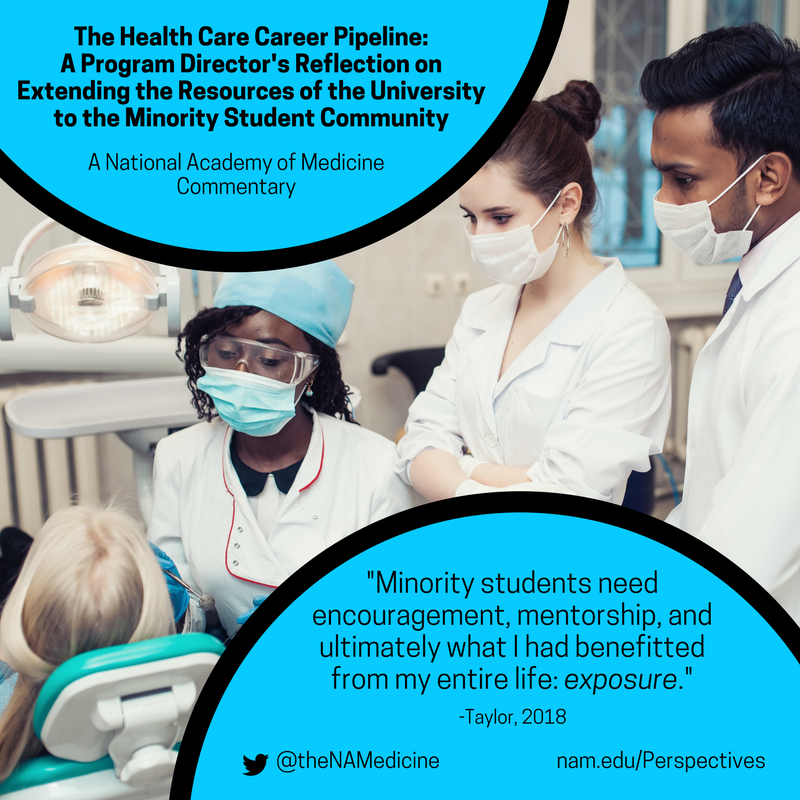The Health Care Career Pipeline: A Program Director's Reflection on Extending the Resources of the University to the Minority Student Community

A journey that begins with a single aspiration to pursue a health care career and concludes with the actual achievement of a degree is filled with challenges, lessons, unexpected detours, and reflection. This discussion will address the need to have programs that contribute to filling existing gaps in diverse student access and exposure to health care career pipeline programming. The health care career journey can be considerably more difficult, and in some ways impossible, for the student who lacks the requisite resources and exposure to mentors and sponsors that serve as key components to career success. The relationship between the university and the minority student community is integral. As program director of a health care career pipeline fellowship program at Northwestern University, I am grateful for the opportunity to welcome students of varying grade levels, academic prowess, and socioeconomic status to be part of a combined summer cohort. Although applicants are diverse in many ways, they all share the common goal of desiring a health care career.
Reflection
I am an African American woman, born into a family that believes education is the catalyst to living a life of liberty and depth. My mother sacrificed, working two jobs to pay private-school tuition from high school to graduate school. Throughout my academic career, I was exposed to innumerable pipeline programs at every level that targeted students interested in health care careers. I shadowed physicians, observed surgeries, and peered over the shoulder of a neonatologist while she worked to help a newborn breathe. The schools that I attended had a plethora of resources available to students to aid in career success.
Although I am grateful for all my academic experiences, I am saddened that the aforementioned academic reflection is one that isn’t the norm for many minority students in Chicago Public Schools. I wasn’t awarded opportunities because I was particularly precocious in STEM curriculum. I was simply in a privileged academic environment with the resources to provide my peers and me with enriching and innovative programming. I was awarded with placement in summer programs that should have been available to every student with an interest, at every school, irrespective of an individual’s place of residence or ability to pay tuition.
Revelation
As I matriculated through various programs, the gaps in the quality of education became immensely apparent and moved me to teach underresourced high school students on the East Side of Chicago, an area historically plagued with violence and poverty. I felt a responsibility to be part of working toward a solution to exposing students to careers and programs that would set them up to achieve career success. In an effort to assess existing health care career knowledge, I simply asked students if they could name health care careers. Hands flailed excitedly in the air, but the majority of students could only name doctor or nurse as health care career options, and many didn’t perceive health care careers as even remotely achievable. Students cited lack of finances, family conflicts, and limited knowledge about how to start preparing for a health care career as reasons for abandoning aspirations. Some of the most academically talented students revealed that they didn’t feel smart enough to survive a medical school curriculum. A 2015 report released by the Association of American Medical Colleges addressing the representation of African American men in medical school [1] reiterates that high school juniors in a 2007 study also listed limited knowledge of career pathways and poor access to African American role models as barriers to African American men pursuing medical careers [2]. Minority students need encouragement, mentorship, and ultimately what I had benefited from my entire life: exposure.
I reached out to surrounding medical schools and submitted requests to form partnerships. University of Chicago medical students visited the class, bringing a healthy and diseased lung and heart. They enthusiastically shared with mesmerized high school students the importance of not smoking and leading healthy lives. The medical students also recounted experiences and stayed beyond the allotted time to answer questions about applying to medical school and balancing personal and academic commitments as medical students. Students shared later that they were shocked that the medical students had revealed academic struggles and told stories about growing up in poverty. I surmised that if this one experience yielded such a powerful response, larger-scale partnerships between universities and community high schools should definitely be explored.
The Chicago Public School system is experiencing a mass decline in enrollment. Since 2013, approximately 32,000 students have left the system to move to suburban counties [3]. Many underresourced and underenrolled schools are housed in low-income neighborhoods, where a large proportion of minority students reside. I submit that even a community plagued with violence, pervasive food deserts, and chronic illness is not void of academically talented, driven, and ingenious students. Academic institutions, specifically those tied to an academic medical center, are uniquely situated to help fill in the gaps in opportunity that poverty, violence, and neglect have created. As the workforce becomes increasingly competitive, universities must commit to unequivocally leveraging resources to shepherd minority students through the pipeline to attaining a health care career.
Opening the Doors of the University: A Health Care Career Pipeline Fellowship
Academic medical centers can provide the prospective minority postsecondary student with access to important relationships that go beyond mentorship and blossom into sponsorship. One example is the Chicago Cancer Health Equity Collaborative Research Fellows Program, a tri-institutional health care career pipeline program that affords students the opportunity to progress throughout the summer, networking with a wide variety of physician scientists, health care professionals, and stakeholders from multiple institutions, communities, and social justice organizations. The cohort synthesizes information garnered from a comprehensive learning experience that includes preparation for careers in social and behavioral science and biomedical research, community immersion visits, research rotations, professional skill development, and lab experiences. All roads of the program lead to the ultimate advancement of solutions to health inequities in and around Chicago.
Fellows are encouraged by physicians who are transparent in sharing difficulties encountered during their own career journeys. Both nonminority and minority physicians have reflected on times when they have lacked the aptitude to excel academically in medical school, and have passionately credited consistent socioemotional and academic sponsorship for their ability to attain a medical degree. Other health care professionals and leaders share stories of how combinations of resilience and relentless study habits have contributed significantly to career success. All health care professionals and leaders volunteer time to be part of the fellowship experience and willingly provide students with contact information, encouraging them to reach out even after the conclusion of their summer for mentorship, lab placement experiences, jobs, and informational interview opportunities. “This is the first time I’ve ever seen a black male physician,” an African American fellow remarked after hearing the career journey of Dr. Clyde Yancy, vice dean of diversity and inclusion, and division chief of cardiology at Northwestern’s Feinberg School of Medicine. I routinely receive emails from fellows grateful for the opportunity to encounter physicians with whom they share ethnic and racial backgrounds.
Through such programs, students can receive guidance from leading professionals in fields of interest while securing once-in-a-lifetime opportunities to gain the sponsorship that is essential in propelling them toward career success. Dr. Melissa Simon, vice chair of clinical research at Northwestern and the Research Fellows Program founder, offers a health care workforce development Massive Open Online Course, Career 911: Your Future Job in Medicine and Health Care (https://www.coursera.org/learn/healthcarejobs). The global course aims to expose nontraditional and high school students to the possibility of pursuing a health care career. Course content has been integrated with the Chicago Public School Career and Technical Education curriculum, functioning as an additional tool to strengthen the health care career pipeline. Participants build a career portfolio that includes personal statements, cover letters, and other materials pertinent to career development. Dr. Simon has sponsored several students by intentionally forging connections with a network of colleagues. She has created lab placements, provided student recommendations, and given her time for admission preparation to medical school and other graduate programs.
These types of programs have enormous potential benefit for students, but improving access for students from all backgrounds remains a challenge. Recruitment for these types of programs should not solely target high-performing students from traditionally high-ranking institutions, which weakens the health care career pipeline and perpetuates the existing trend of declining minority enrollment in medical school and graduate programs related to health care careers. Institutional leaders should seek to understand the individual needs of the minority student while strategically planning to include creative and engaging programmatic elements that help differentiate STEM programming for all learning styles. It is important to note that the inability to create programs at universities and academic medical centers that reach minority communities can eventually reinforce health inequities. As the field of medicine progresses toward precision medicine initiatives [4], where the treatment of disease considers the individual lifestyles of people of varying races and ethnicities at the molecular level, the contribution of minority physicians is paramount. It is impossible to truly understand the molecular intricacies of an individual ethnicity without including the scientific purview of the minority physician.
Leveraging long-standing university resources is a natural and feasible direction for future health and education policies. Minority student entry into the health care career pipeline is just the beginning of an arduous journey. The development of health care career programs that are strategically intentional about supporting minority students all the way through to career placement is profoundly requisite in paving a cogent pathway toward achieving diversity in the health care workforce.
Join the conversation!
![]() Tweet this! “…the inability to create programs that reach minority communities can eventually reinforce health inequities.” Read more about the need to provide minority students access to the health care career pipeline: http://ow.ly/X5Er30j1F9Z
Tweet this! “…the inability to create programs that reach minority communities can eventually reinforce health inequities.” Read more about the need to provide minority students access to the health care career pipeline: http://ow.ly/X5Er30j1F9Z
![]() Tweet this! “This is the first time I’ve ever seen a black male physician.” The author of our newest Commentary argues that health care career pipeline programs for minority and underprivileged communities are critically needed: http://ow.ly/X5Er30j1F9Z
Tweet this! “This is the first time I’ve ever seen a black male physician.” The author of our newest Commentary argues that health care career pipeline programs for minority and underprivileged communities are critically needed: http://ow.ly/X5Er30j1F9Z
![]() Tweet this! New commentary argues that the inclusion of minority voices in health care is not only equitable, but will be essential when the field moves toward individualized medicine. Read more about how health care pipeline programs can help: http://ow.ly/X5Er30j1F9Z
Tweet this! New commentary argues that the inclusion of minority voices in health care is not only equitable, but will be essential when the field moves toward individualized medicine. Read more about how health care pipeline programs can help: http://ow.ly/X5Er30j1F9Z
Download the graphics below and share them on social media!
References
- The Association of American Medical Colleges (AAMC). 2015. Altering the course: Black males in medicine. Washington, DC. Available at: https://members.aamc.org/eweb/upload/Altering%20the%20Course%20-%20Black%20Males%20in%20Medicine%20AAMC.pdf (accessed September 1, 2020).
- Rao, V., and Flores, G. 2007. Why aren’t there more African-American physicians? A qualitative study and exploratory inquiry of African-American students’ perspectives on careers in medicine. Journal of the National Medical Association 99:986-993. Available at: https://www.ncbi.nlm.nih.gov/pmc/articles/PMC2575862/ (accessed September 1, 2020).
- Silets, A. 2017. Declining CPS enrollment could lead to more school closings. Chicago Tonight. Available at: http://chicagotonight.wttw.com/2017/11/27/declining-cps-enrollment-could-lead-more-school-closings (accessed November 27, 2017).
- National Institute of Health (NIH). 2017. Help me understand genetics: Precision medicine. Available at: https://ghr.nlm.nih.gov/primer (accessed November 27, 2017).

